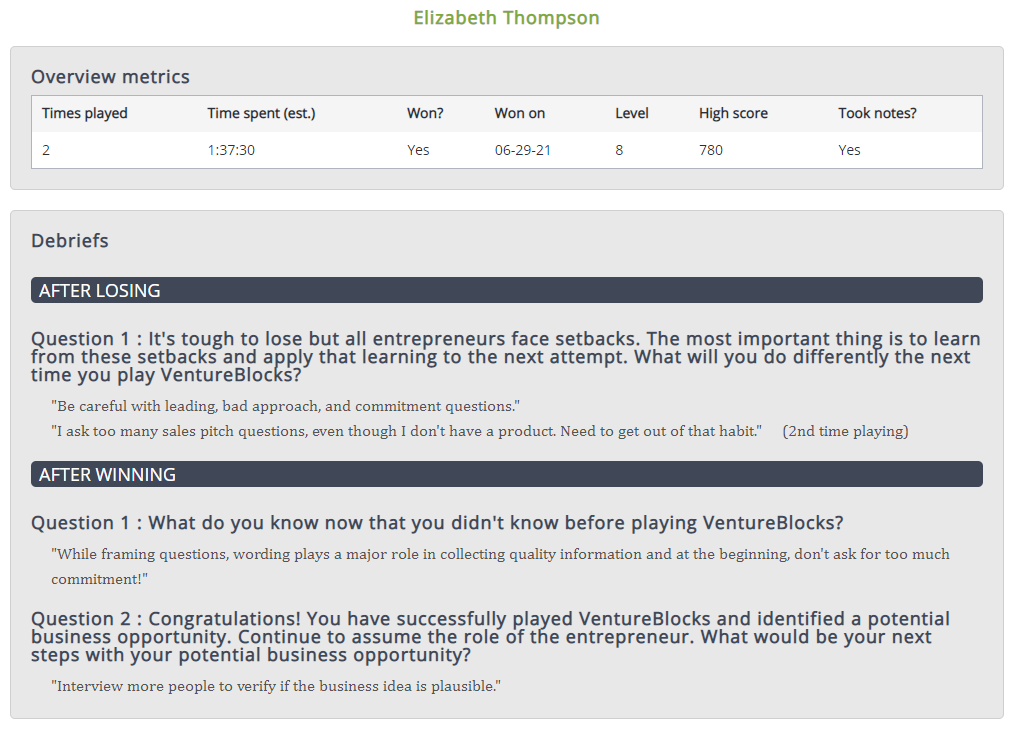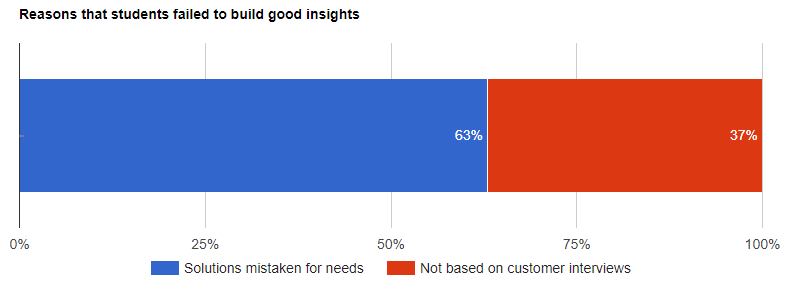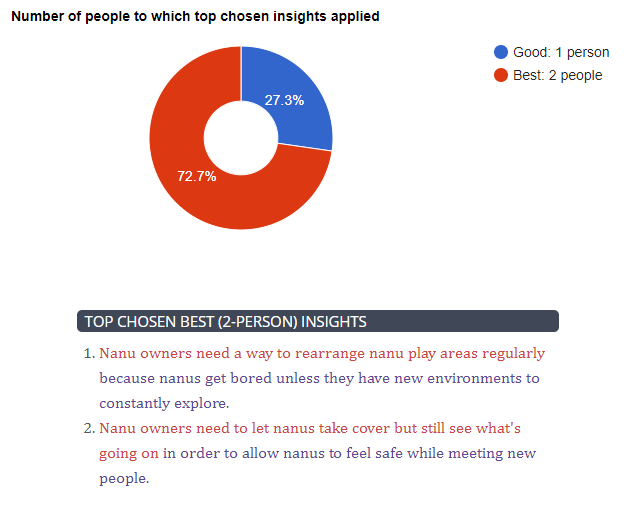- How long does it take students to play the simulation?
- What are my options for using VentureBlocks in my course?
- Can the simulation be played in teams?
- Can VentureBlocks be graded?
- What are best practices related to using VentureBlocks as a graded course component?
- How do I know if students are learning anything playing VentureBlocks?
- What are the primary learning objectives?
- Can the built-in reflection questions be customized?
- When is the best time in a course to assign the simulation?
- Who do I contact if I have technical issues?
- Is there a teaching note?
- What is the best way to debrief the experience after students play VentureBlocks?
- What is the maximum number of points that can be earned in the game?
- Should a student play VentureBlocks more than once?
- What types of analytics are collected?
How long does it take students to play the simulation?
The average play time is 45-60 minutes. However, in an average class of 30 students there are typically a few who complete the simulation in only 30 minutes and few who need 90 minutes. If you have many students in your class who are not native English speakers, it is better to estimate 60-90 minutes. Because students finish playing at different times, most of our users find it easier to assign the VentureBlocks simulation as a homework activity.
What are my options for using VentureBlocks in my course?
There are three primary ways to use VentureBlocks in a course ranging from quick and easy to a deeper dive into core concepts.
Option 1: Just the simulation. This is the easiest and fastest way and learning takes place in the simulation through computer-generated feedback.
Option 2: Simulation + debrief. As students play the simulation, VentureBlocks collects detailed analytics about what your class did well and what your students struggled with the most. Are they asking the right questions? Jumping to a sales pitch before knowing the customers' needs? Or maybe they didn't identify a key pattern across their interviews. Each class is different and we'll show you everything you need to know about your students to lead a meaningful "debrief" after they play. We even have a PowerPoint for you!
Option 3: Simulation + debrief + in-class exercise. In addition to option 2, we designed another practice-based exercise where students break into groups (in person or online) and apply the concepts learned in the simulation. This gives students one more practice session interviewing customers before doing it for real outside of class.
Can the simulation be played in teams?
Because the simulation is personalized for each player, we have found that students learn most when playing individually. If students play in teams of 2, there is still some learning, but each student only makes some mistakes (rather than all, which is what they need to understand all elements of customer discovery), and teams of 3 or more are not recommended at all because at least one student gets overruled in every decision. If you elect to use the in-class exercise provided with the simulation, students will work in teams at that time.
Can VentureBlocks be graded?
Absolutely! And we make it easy to do so. For each student who plays, you'll get a "report card" that shows you both their simulation score and their real-time, qualitative reflections while playing. It's everything you need to give them a fair and accurate grade that reflects the following:
- The individual challenges each student faced when learning to talk to customers and how they overcame them, and
- How well each student learned ask the right questions, listen to the responses, probe about important topics, talk to enough people, identify the needs of each person, and identify key trends across multiple conversations, and
- What exactly each student learned when they suffered a setback, as well as when they completed the whole simulation.
Here's an example:

You can view all available analytics in the Example Analytics section if you sign up for an instructor account.
What are best practices related to using VentureBlocks as a graded course component?
Our experience working with hundreds of educators suggests three important considerations when using VentureBlocks as a graded course component.
- Don't base students' grades on their scores. First and foremost, we have to warn you that basing a student's grade on their score in an online game takes all the fun out of the game immediately. Even though the experience points of each student (out of 800 XP) are an accurate indicator of how well they learned the material we don't recommend telling them it affects their grade (unless it's a very small, insignificant portion).
- A grade can only be earned by finishing the simulation. We designed the simulation so that each mission gets progressively more challenging, and each level can be replayed as many times as a student needs to win. There's no good reason a student wouldn't be able to completely finish the simulation. We've heard some interesting excuses over the years, though!
- Create your own reflection questions for extra points. When you create a course in our system for students to play, you'll have the option to enter reflection questions that students must answer when they win or lose the simulation. We have some default questions we found to be effective, but you can write your own. Also, unlike essays that students may write long after playing, these questions are asked at the exact moment a student wins or loses, allowing us to capture exactly what they're thinking.
How do I know if students are learning anything playing VentureBlocks?
Without help, it's hard to measure how well your students are learning when it comes to talking to customers and getting valuable insights from those conversations. Did they ask the right questions, listen to the responses, probe important topics, talk to enough people, and the right people? The analytics collected through game play will help you answer these questions and more.
Here are three examples of many insightful reports you'll get about your students:
1. What kinds of questions are students asking that are hurting their ability to conduct meaningful customer interviews?

2. How well are students listening to their potential customers and picking up of crucial details about their individual needs?

3. How good are students at identifying common patterns across multiple interviews that they conducted?

What are the primary learning objectives?
VentureBlocks was designed with a specific set of learning objectives. Through playing VentureBlocks students will:
- Develop a better understanding of approaching opportunity creation through the identification of customer needs.
- Practice interviewing potential customers including:
- Approaching strangers and starting a conversation.
- Asking good open-ended questions to get useful and relevant information.
- Identifying bad questions that would make real-world customer interviews unsuccessful.
- Feeling rejection when someone does not want to engage in a conversation.
- Improve listening and observation skills to identify the needs of potential customers and build strong customer insights.
- Cultivate pattern recognition skills to identify potential opportunities that meet the needs of multiple customer types.
- Distinguish between needs, customer insights, and solutions.
- Apply learning from unsuccessful attempts to future attempts and develop an appreciation for the necessity of iteration.
- Reflect on both successes and failures through built-in debrief questions.
Can the built-in reflection questions be customized?
Absolutely and we encourage you to create your own questions. When you create a course in our system for students to play, you'll have the option to enter reflection questions that students must answer when they win or lose the simulation. We have some default questions we found to be effective, but you can write your own. Also, unlike essays that students may write long after playing, these questions are asked at the exact moment a student wins or loses, allowing you to capture exactly what they're thinking.
The default questions after winning the simulation are:
- What do you know now that you didn't know before playing VentureBlocks?
- Congratulations! You have successfully played VentureBlocks and identified a potential business opportunity. Continue to assume the role of the entrepreneur. What would be your next steps with your potential business opportunity?
The default question after losing the simulation is:
- It's tough to lose but all entrepreneurs face setbacks. The most important thing is to learn from these setbacks and apply that learning to the next attempt. What will you do differently the next time you play VentureBlocks?
When is the best time in a course to assign the simulation?
BEFORE students have a new venture idea and before they go out to interview people as part of their customer discovery efforts. Many of our instructors even assign VentureBlocks as homework before the first day of class (and then debrief in the first class). VentureBlocks is most effective when students have little to no interviewing experience, are trying to find a marketable new venture idea, and are scared to talk to strangers!
Who do I contact if I have technical issues?
We have worked extremely hard to resolve all technical issues, but if instructors or their students have problems, they should email support@ventureblocks.com, and we also offer phone support 9am-5pm EST, Monday-Friday, at +1 (617) 383-7467.
Is there a teaching note?
Of course! Yes there is an extensive teaching note that walks you through every aspect of the simulation, but we also have an online portal that gives you everything you need at a glance. This includes step-by-step instructions to set up the simulation for your class (4 easy steps), debrief powerpoint, in-class add on exercise, and other resources. Once you sign up for an instructor account, you can view and download all materials.
What is the best way to debrief the experience after students play VentureBlocks?
Our teaching note gives many options but at a minimum we offer a brief PowerPoint presentation. We also strongly encourage instructors to show some of the class-wide analytics available.
What is the maximum number of points that can be earned in the game?
Students complete 8 levels of gameplay and they can see their total points (called Experience Points, "XP") and their rank relative to other classmates in the course leaderboard. Experience points are earned by completing missions on each level. In addition, there is a bonus mission that students can complete for extra XP. The total possible earned in the simulation is 800 XP.
Should a student play VentureBlocks more than once?
VentureBlocks is designed so that students play until they win. Students typically lose up to 2 times (meaning they have to start over) as they play, but this is by design to foster learning. We don't recommend play again after winning because winning indicates that learning has been achieved.
What types of analytics are collected?
As students play VentureBlocks, the analytics you'll see are organized into the following 4 reports:
- Live Leaderboard:
Automatically updated rankings for all the students currently in your class. Great for putting on the front screen if students are playing in class. - Class Strengths and Weaknesses:
An overall snapshot of what your students are good at, and what they struggled with. Great for sharing with students as part of your post-simulation debrief. - Report Cards by Student:
Details about each student's individual performance (including answers to debrief questions), to make grading easier. When printed, each student gets a separate page. - Class Averages:
Class averages for key metrics, and how each student compares.
You can view all available analytics in the Example Analytics section if you sign up for an instructor account.
Create a free instructor account
Download the teaching note, see example analytics, and play the full simulation
SIGN UP NOWPrefer to get a personalized walkthrough?
Schedule a call with the founder of VentureBlocks
SCHEDULE MY FREE CONSULTATION